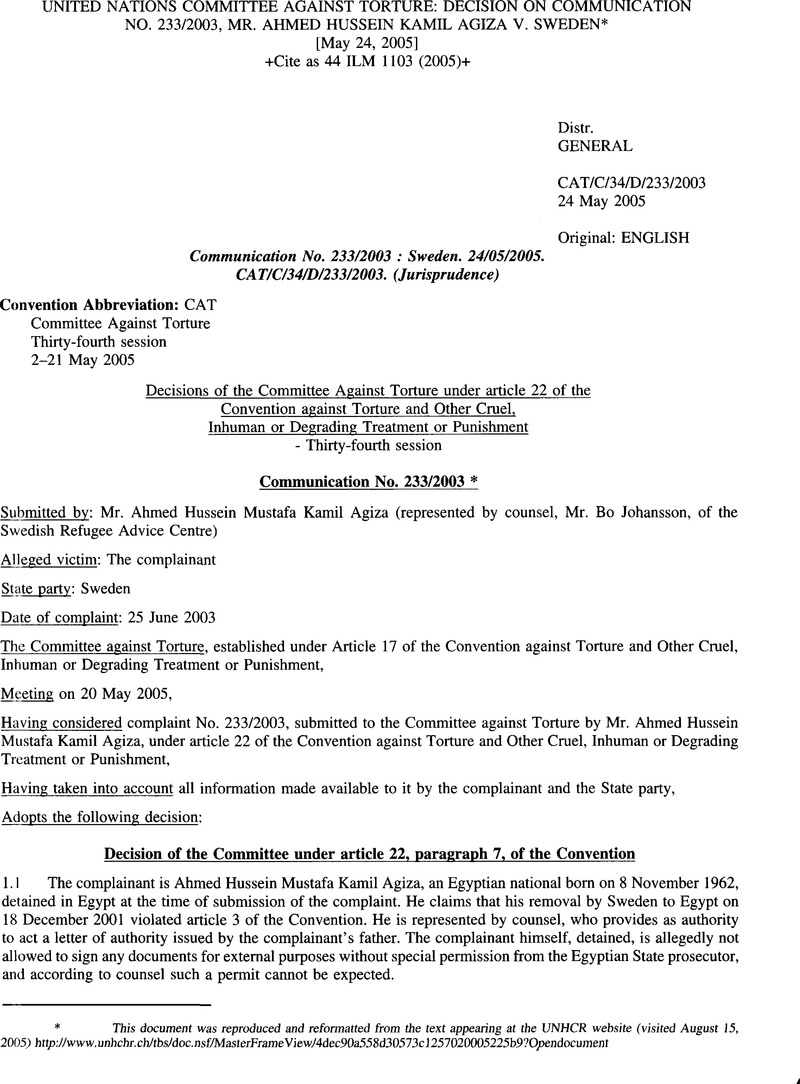Article contents
United Nations Committee Against Torture: Decision on Communication No. 233/2003, Mr. Ahmed Hussein Kamil Agiza v. Sweden*
Published online by Cambridge University Press: 27 February 2017
Abstract

- Type
- Judicial and Similar Proceedings
- Information
- Copyright
- Copyright © American Society of International Law 2005
Footnotes
This document was reproduced and reformatted from the text appearing at the UNHCR website (visited August 15, 2005) http://www.unhchr.cMbsydoc.Jisf/MasterFrameView/4dec90a558d30573cJ257020005225b97Opendocument
References
1 Counsel states that the following information concerning the complainant's whereabouts and well-being originates from Swedish diplomatic sources, the complainant's parents, a Swedish radio reporter and the complainant's Egyptian attorney.
2 Counsel states that the following information concerning the complainant's whereabouts and well-being originates from Swedish diplomatic sources, the complainant's parents, a Swedish radio reporter and the complainant's Egyptian attorney.
3 Judgment of 15 November 1996.
4 Rule 107(f) provides: “With a view to reaching a decision on the admissibility of a complaint, the Committee, its Working Group or a rapporteur designated under rules 98 or 106, paragraph 3, shall ascertain: … (f) That the time elapsed since the exhaustion of domestic remedies is not so unreasonably prolonged as to render consideration of the claims unduly difficult by the Committee or the State party.“
5 Hanan Ahmed Fouad Abd El Khalek Attia v. Sweden, Case No 199/2002, Decision adopted on 17 November 2003.
6 Ibid.
7 Rule 107(b) provides: “With a view to reaching a decision on the admissibility of a complaint, the Committee, its Working Group or a rapporteur designated under rules 98 or 106, paragraph 3, shall ascertain: … (b) That the complaint is not an abuse of the Committee's process or manifestly unfounded.“
8 A/57/173, 2 July 2002.
9 These took place on 23 January, 7 March, 14 April, 27 May, 24 June, 22 July, 9 September and 4 November 2002, as well as 19 January, 5 March, 9 April, 14 May, 9 June, 29 July, 25 August, 30 September and 17 November 2003.
10 Ibid.
11 Ibid.
12 Human Rights Watch: “Empty Promises : Diplomatic Assurances No Safeguard against Torture ”.April 2004, Vol.16 No. 4(D).
13 Counsel has supplied a transcript of the programme.
14 Counsel supplies a public statement by Amnesty International, dated 28 May 2004, entitled “Sweden : Concerns over the treatment of deported Egyptians” calling for an “international, wide-ranging, independent and impartial investigation “(EUR 42/001/2004), and, to similar effect, a statement by Human Rights Watch, dated 27 May 2004, entitled “Sweden : Torture Inquiry Must Be Under U.N. Auspices”.
15 Counsel cites in support a public statement by Human Rights Watch, dated 4 May 2004, entitled ‘ ‘Sweden/Egypt: Suspected Militant's Unfair Trial and Torture Claims Implicate Sweden''.
16 Report by Mr. Alvaro Gil-Robles, Commissioner for Human Rights, on his Visit to Sweden (21-23 April 2003), Commdh(2004)13, stating, at paragraph 19: “The second point relates to the use of diplomatic assurances regarding the treatment of deported aliens in the countries to which they are returned. This example, which is not unique to Sweden, clearly illustrates the risks of relying on diplomatic assurances. The weakness inherent in the practice of diplomatic assurances lies in the fact that where there is a need for such assurances, there is clearly an acknowledged risk of torture and ill-treatment. Due to the absolute nature of the prohibition of torture or inhuman or degrading treatment, formal assurances cannot suffice where a risk nonetheless remains. As the UN Special Rapporteur on Torture has noted, such assurances must be unequivocal and a system to monitor such assurances must be in place. When assessing the reliability of diplomatic assurances, an essential criteria must be that the receiving state does not practice or condone torture or ill-treatment, and that it exercises effective control over the acts of non-state agents. In all other circumstances it is highly questionable whether assurances can be regarded as providing indisputable safeguards against torture and ill-treatment.“
17 Op.cit.
18 Security Council Resolution 1566 (2004), at preambular paragraphs 3 and 6, Resolution 1456 (2003) at paragraph 6, and Resolution 1373 (2001) at paragraph 3(f).
19 See, among other sources, the Report of the Committee against Torture to the General Assembly (A/51/44), at paragraphs 180 to 222 and the Committee's Conclusions and Recommendations on the fourth periodic report of Egypt (CAT/C/CR/29/ 4, 23 December 2002).
20 Op.cit.
21 See articles 12 to 14 in relation to an allegation of torture.
22 See Dzemajl v. Yugoslavia, Case No 161/2000, Decision adopted on 21 November 2002, at paragraph 9.6.: “The positive obligations that flow from the first sentence of article 16 of the Convention include an obligation to grant redress and compensate the victims of an act in breach of that provision. The Committee is therefore of the view that the State party has failed to observe its obligations under article 16 of the Convention by failing to enable the complainants to obtain redress and to provide them with fair and adequate compensation.“
23 Arkauz Arana v. France, Case No. 63/1997, Decision adopted on 9 November 1999, at paragraphs 11.5 and 12.
- 2
- Cited by




